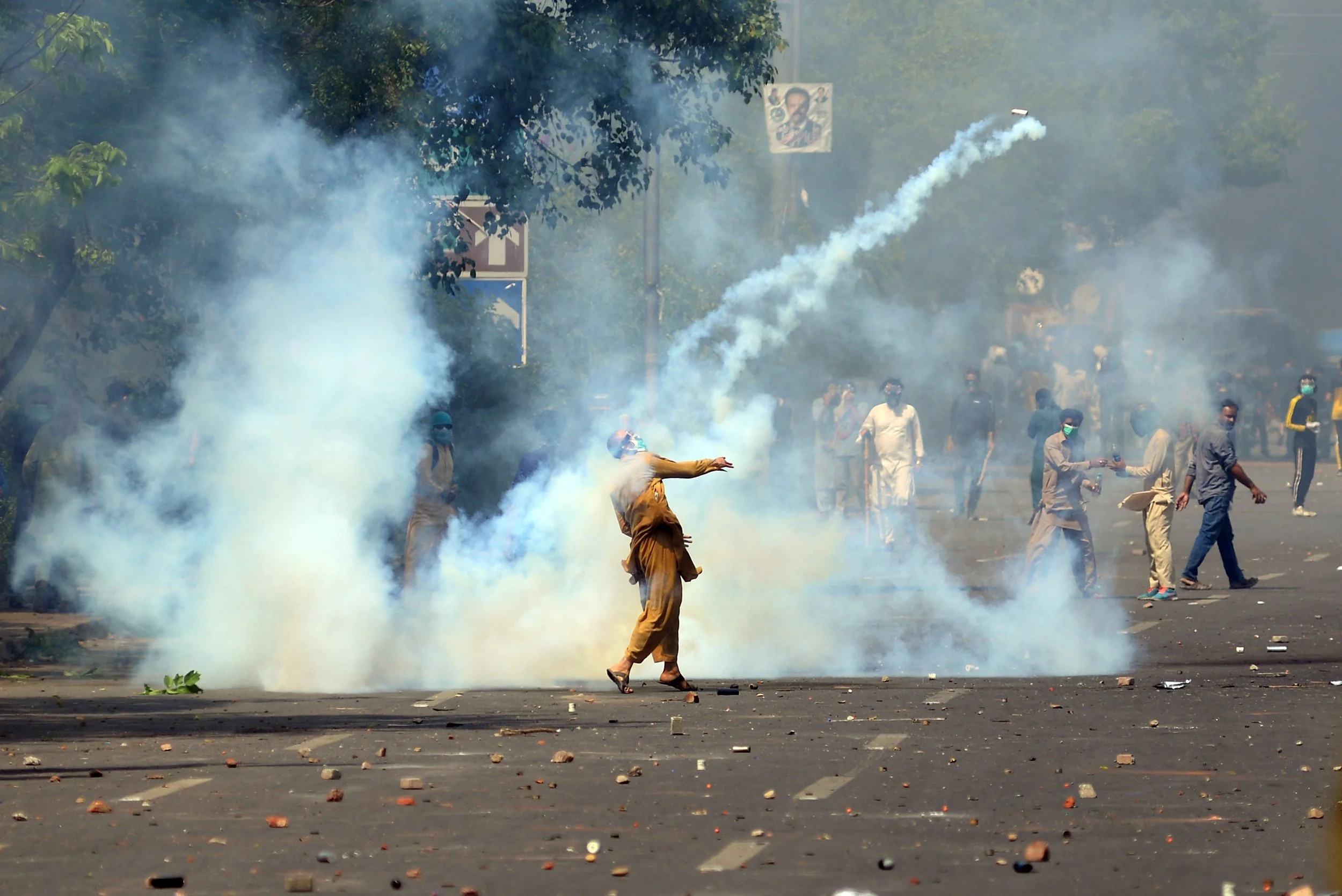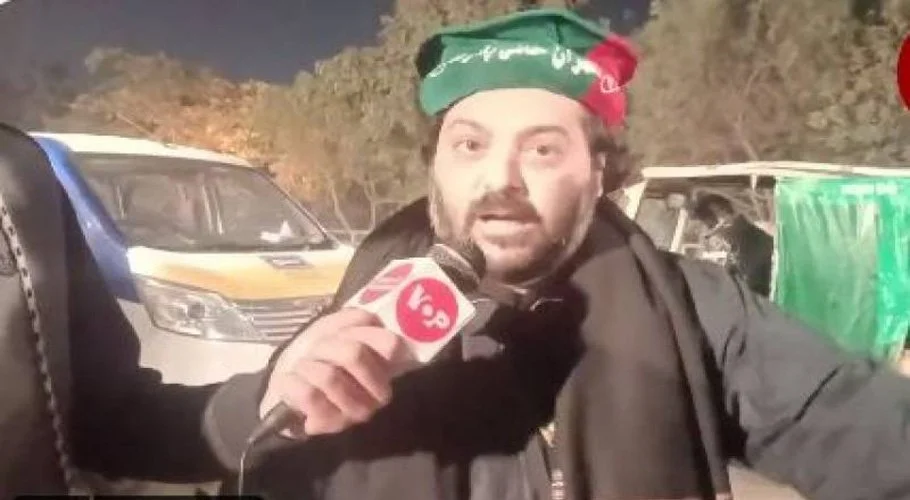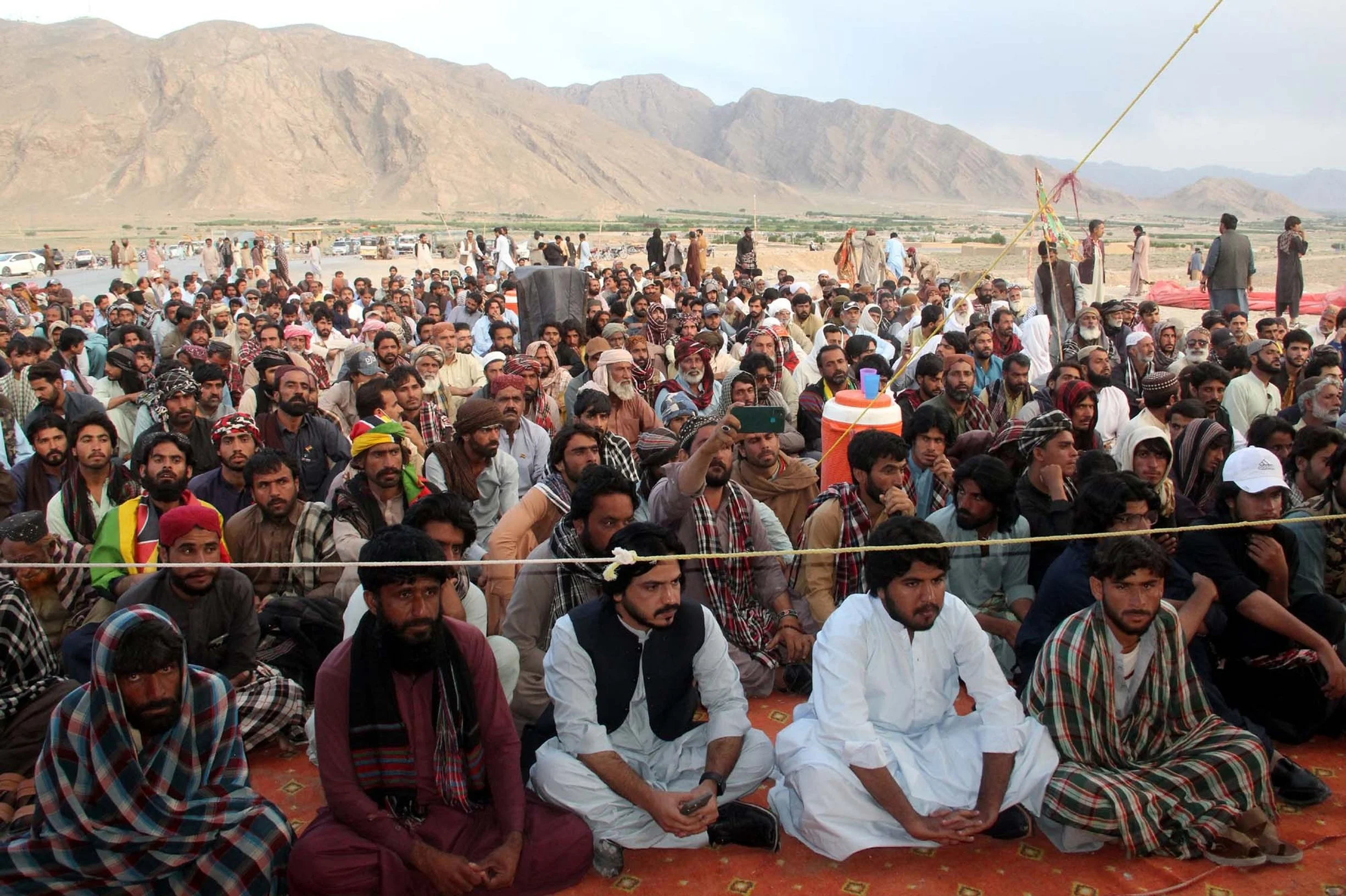Violation of Freedom of Expression and Civil Liberties
Peaceful Protest and Political Campaigning
Since the ousting of former Prime Minister Imran Khan in April 2022, Pakistan has witnessed a severe erosion of political freedoms. This period has been marked by intensified censorship, violent crackdowns on dissent, and widespread state-led repression driven by military authoritarianism.
Peaceful pro-democracy supporters have been the primary targets of this suppression including women, children, and the elderly—have been subjected to tear gas, physical violence, and mass arrests during peaceful demonstrations. Media outlets have faced bans on covering PTI rallies, while party members and supporters have been abducted, tortured, and denied the right to assemble freely.
PHOTO: Supporters of Pakistan's former Prime Minister Imran Khan remove tear gas shell fired by police to disperse them during a protest against the arrest of their leader, in Lahore, Pakistan, May 10, 2023.
The 9 May Crackdown
The most prominent example of state repression occurred on 9 May 2023, when nationwide protests erupted following Imran Khan’s arrest. The state’s response was swift and brutal, resulting in dozens of deaths, widespread arrests of more than 10,000 protesters and political activists, and a complete shutdown of internet services to stifle communication and mobilisation. Political offices were raided, and PTI workers were detained, mostly without evidence or legal due process.
The Case of Zille Shah
Bilal Shah, known affectionately as “Zille Shah,” was a 40-year-old peaceful protester and a person with learning difficulties from Lahore. He was arrested on 3 March 2023 and subjected to brutal torture while in police custody. His body, bearing injuries to over 36 areas as confirmed by a post-mortem report, was later found abandoned in Lahore. Authorities initially claimed he had died in a road accident, then later changed their statements multiple times—highlighting the lack of accountability and transparency surrounding deaths in custody.
PTI activist Zille Shah
Image credit: Daily Times
Attacks on Journalists and the Murder of Arshad Sharif
Journalists and media professionals have also been heavily targeted, facing harassment, legal threats, abductions, and physical violence. Some had fled the country for the United States and Europe. A chilling example is the murder of renowned investigative journalist Arshad Sharif. A fierce critic of military overreach, Sharif had fled Pakistan after receiving multiple death threats—threats he documented in a letter to the Supreme Court. He was shot and killed under suspicious circumstances in Kenya on 23 October 2022. The case remains unresolved, and the circumstances very strongly indicate extrajudicial involvement from Pakistan.
Amnesty International Kenya condemned the killing of Arshad Sharif by police and called for an independent investigation into the incident.
The Committee to Protect Journalists (CPJ) has been actively involved in seeking justice for Arshad Sharif. In May 2023, CPJ, along with 14 other organisations, called on Kenyan authorities to expedite investigations into Sharif's killing and ensure accountability through a transparent judicial process.
Reporters Without Borders (RSF) has also called for an independent international investigation into Arshad Sharif's murder. They criticised the lack of progress in the case and urged both Pakistani and Kenyan authorities to take appropriate actions to ensure justice is served.
The International Federation of Journalists (IFJ) reported on findings from a Pakistani investigative team that concluded Sharif's killing was a "planned targeted assassination." The IFJ urged authorities to continue their investigation transparently and swiftly to ensure all perpetrators are brought to justice.
Journalist Arshad Sharif
Image credit: Pakistan Today
Repression of Journalistic Voices
YouTube has informed more than two dozen critics of the Pakistani government that it is reviewing a court directive seeking to block their channels for allegedly being “anti-state”.
The channels at risk of being blocked in Pakistan include those belonging to the main opposition party, its leader and jailed former Prime Minister Imran Khan, as well as several journalists critical of the government, according to a court order dated June 24th 2025.
The judicial magistrate court in Islamabad said it was seeking the ban after the National Cyber Crime Investigation Agency criticised the channels in a June 2 report for “sharing highly intimidating, provocative and derogatory contents against state institutions and officials of the state of Pakistan”.
According to the court order, the move follows a June 2 report from Pakistan’s National Cyber Crime Investigation Agency, which accused the channels of disseminating "highly intimidating, provocative, and derogatory content" against state institutions and officials.
This development demonstrates serious violation over freedom of expression and the increasing use of digital censorship and transnational repression against political dissent in Pakistan.
A court order designating YouTube channels as offenders under a controversial and improper application of the Electronic Crimes Act to surpress dissenting voices online.
Repression of Minority Voices
The Baloch community has faced particularly severe restrictions on freedom of expression. Prominent activists such as Dr Mahrang Baloch and Sabiha Baloch have endured harassment, arbitrary arrests, and travel bans due to their advocacy against enforced disappearances in Balochistan. Dr Baloch was barred from attending a TIME100 event in New York in October 2024, where she was being honoured for her activism. She was later arrested during a peaceful protest in Quetta on 22 March 2025.
PHOTO: Activists of Balochistan National Party are holding protest demonstration against the recent arrests of rights activists, at Lakpass Tunnel on April 9, 2025 in Quetta.





